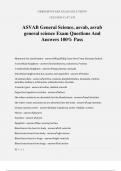©BRIGHTSTARS EXAM SOLUTIONS
11/15/2024 11:57 AM
ASVAB General Science, asvab, asvab
general science Exam Questions And
Answers 100% Pass
Mnemonic for classification - answer✔King Philip Came Over From Germany Soaked
3 unicellular kingdoms - answer✔archaebacteria, eubacteria, Protista
3 multicellular kingdoms - answer✔fungi, plantae, animalia
Unicellular kingdom that has nucleus and organelles - answer✔Protista
10 animal phyla - answer✔porifera, cnidaria, platyhelminthes, nematoda, rotifera,
annelida, mollusca, arthropoda, echinodermata, chordate
3 muscle types - answer✔cardiac, skeletal, smooth
Organ that regulates excretion - answer✔kidney
Site where nutrients are absorbed into the bloodstream - answer✔small intestine
Site where water and minerals are absorbed into the body - answer✔large intestine
Urinary systems order - answer✔kidney (nephron), ureter, bladder, urethra
Throat - answer✔pharynx
Voicebox - answer✔larynx
Epiglottis - answer✔flap covering trachea
Blood leaves the heart to body - answer✔left ventricle
Blood enters heart from body - answer✔right atrium
Blood leaves heart to lungs - answer✔right ventricle
Blood enters heart from lungs - answer✔left atrium
1|Page
, ©BRIGHTSTARS EXAM SOLUTIONS
11/15/2024 11:57 AM
Exchange oxygen, nutrients, and wastes with the tissues of the body - answer✔capillaries
Arteries - answer✔carry oxygenated blood away from the heart
Veins - answer✔carry deoxygenated blood back to the heart
Universal blood donor - answer✔type O
Universal blood recipient - answer✔type AB
2 parts of nervous system - answer✔central & peripheral
2 parts of peripheral nervous system - answer✔somatic & autonomic
2 pats of autonomic nervous system - answer✔sympathetic & parasympathetic
Controls all voluntary activities and receives sensory input - answer✔cerebrum
Coordinates motor activity - answer✔cerebellum
Regulates homeostasis and secrets hormones - answer✔hypothalamus
Controls involuntary actions such as breathing and swallowing - answer✔medulla
Deficiency causes night blindness, skin infections, loss of appetite, diarrhea -
answer✔vitamin A
Deficiency causes loss of appetite, beriberi - answer✔vitamin B1
Deficiency causes weakness, skin infections - answer✔vitamin B2
Deficiency causes anemia, nerve degeneration - answer✔vitamin B12
Deficiency causes scurvy - answer✔vitamin C
Deficiency causes rickets, tooth decay - answer✔vitamin D
Deficiency causes anemia - answer✔vitamin E
Deficiency causes excessive bleeding - answer✔vitamin K
Sorts and packages proteins - answer✔Golgi body
Digest old organelles and foreign substances - answer✔lysosomes
Produce energy for the cell - answer✔mitochondria
Part of the nucleus that makes ribosomes - answer✔nucleolus
2|Page
, ©BRIGHTSTARS EXAM SOLUTIONS
11/15/2024 11:57 AM
Control center of the cell and contains chromosomes - answer✔nucleus
Form spindle fibers during cellular division - answer✔centrioles
Site of protein synthesis - answer✔ribosomes
Makes proteins to be exported out of the cell - answer✔rough ER
Makes lipids and detoxifies enzymes - answer✔smooth ER
Stores wastes and other materials - answer✔vacuole
Phases of mitosis - answer✔interphases, prophase, metaphase, anaphase, telophase
Primitive plants lacking true stems - answer✔bryophytes
2 types of tracheophytes - answer✔gymnosperms & angiosperms
2 types of angiosperms - answer✔monocots & dicots
The area of the earth where all living things exists - answer✔biosphere
A large region of the earth - answer✔biome
The interaction of living and nonliving things - answer✔ecosystem
The area in which a group of populations live - answer✔community
A group of individuals that belong to the same species - answer✔population
4 geologic time periods - answer✔Precambrian, Paleozoic, Mesozoic, Cenozoic
3 marine biome zones - answer✔intertidal, neritic, oceanic
4 layers of atmosphere from lowest to highest - answer✔troposphere, stratosphere,
mesosphere, thermosphere
Large pieces of space rock - answer✔asteroids
Small pieces of space rock and metal - answer✔meteoroids
Meteoroids that pass through earth's atmosphere - answer✔meteors
Meteors that strike the ground - answer✔meteorites
Make up of rock, dusts, methane, and ice - answer✔comets
When the moon moves between the sun and earth - answer✔solar eclipse
3|Page
, ©BRIGHTSTARS EXAM SOLUTIONS
11/15/2024 11:57 AM
When the earth moves between the sun and moon - answer✔lunar eclipse
Freezing point of water (C,F,K) - answer✔0, 32, 273.15
Boiling point of water (C,F,K) - answer✔100, 212, 373.15
Formula to convert F to C - answer✔F=9/5C+32
Formula to convert C to F - answer✔C=5/9(F-32)
Formula for momentum - answer✔mass x speed
Formula for power - answer✔work / time
Formula for speed - answer✔distance / time
Electromagnetic spectrum from highest frequency - answer✔G, X, UV, visible, IR,
microwaves, radiowaves
Atomic number equals - answer✔number of protons
Atom that has positive or negative charge - answer✔ion
Mass number equals - answer✔number of protons and neutrons
Ph higher than 7 - answer✔base
Ph lower than 7 - answer✔acid
What are the planets in our solar system from closest to farthest from the sun? -
answer✔Mercury, Venus, Earth, Mars, Jupiter, Saturn, Uranus, and Neptune
In the SI system, _____ is the unit of length, _____ is the unit of time, and _____ is the unit of
mass. - answer✔meter, or m; seconds, or s; kilogram, or kg
Elements are made up of _____, which are made up of positively charged _____, negatively
charged _____, and neutrally charged _____. - answer✔atoms; protons; electrons; neutrons
What are the four different blood types? - answer✔A, B, AB, and O
What are the planets in our solar system from closest to farthest from the sun? -
answer✔Mercury, Venus, Earth, Mars, Jupiter, Saturn, Uranus, and Neptune
What is the taxonomic rank breakdown from most inclusive to least inclusive? -
answer✔Domain, Kingdom, Phylum, Class, Order, Family, Genus, and Species
4|Page




